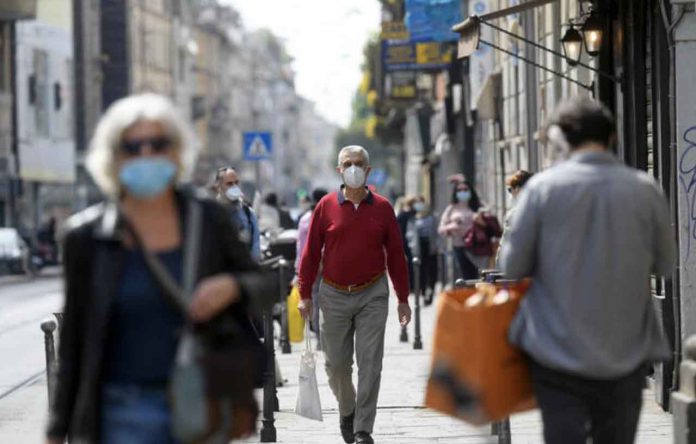
Many cities are tentatively preparing to ease coronavirus lockdowns – but doing so will be a tricky balancing act. Here’s what different cities have planned, from Bogota to Berlin.
By Emma Batha
LONDON – (Thomson Reuters Foundation) – From Sydney re-opening beaches for swimmers to Paris introducing traffic-free roads, many cities are tentatively preparing to ease lockdowns, but governments have a tricky balancing act as they draw up exit strategies.
Lifting restrictions too fast could lead to a new spike in infections overwhelming health services, but prolonging lockdowns could fuel unemployment, harm children’s education and exacerbate domestic abuse and mental health issues.
Bogota and Berlin are among a growing number of cities turning streets over to pedestrians and cyclists to reduce crowding and ease pollution, which appears to aggravate the impact of the virus.
In the longer term, urban planning experts say the pandemic could lead to more fundamental changes to cities as they aim to become more resilient to future outbreaks.
Here is a round-up of what different cities are doing. This story will be regularly updated with new developments.
FRANCE
Paris plans to reserve streets for pedestrians and bicycles when the lockdown is progressively eased from May 11.
Wearing masks will be compulsory on public transport. Paris aims to distribute 2 million masks, prioritizing the elderly and other vulnerable people. Bus stops, metro stations, gyms and nurseries will be equipped with hand gel dispensers.
Testing will be ramped up in areas with a high number of cases.
In the long term, Mayor Anne Hidalgo is aiming for the “quarter-hour city”, where most daily needs are within a short walk, bike ride or public transport commute, to reduce congestion and pollution, and improve quality of life.
SPAIN
Children cooped up indoors in cities across Spain will be allowed out from April 26 – the first time in more than six weeks. They will be permitted to accompany adults to shops or for a walk, but most parks remain shut.
Spain currently has the world’s strictest lockdown. Some fear the restrictions could impact children’s mental and physical wellbeing.
ITALY
Europe’s worst-hit country remains in lockdown but Milan has announced an ambitious scheme to turn streets over to cycling and walking, according to Britain’s Guardian newspaper.
The city, among Europe’s most polluted, is keen to avoid a big resurgence in car use when restrictions ease.
GERMANY
Berlin will ease a host of restrictions on May 4. Public transport will resume normal service, and museums, libraries and open-air sports grounds will be able to open with social distancing.
Protests, religious ceremonies and open-air gatherings of under 50 people will be permitted if participants keep 1.5 metres apart. Berlin’s popular Tiergarten, a big central park with a zoo, can reopen but spaces with animals will stay shut.
As in the rest of Germany, car retailers, bike shops and book stores were allowed to reopen on Monday, along with all smaller shops. Schools also opened for students taking exams and will gradually open to others from May 4.
It is now compulsory for everyone to wear a mask when shopping or using public transport.
Hairdressers have been permitted to reopen but must wear protective gear and space out customers.
In Frankfurt, ice cream parlours are allowed to open for take-aways, but ice creams cannot be sold in cones to prevent contamination, nor eaten within 50 metres of parlours to prevent crowding.
THE NETHERLANDS
The Hague city council has decided to resume meetings but needs to find a larger chamber to keep to social distancing rules.
Across the Netherlands, primary schools will reopen on May 11 with classes split into two groups attending on alternate days. Parents have been asked to walk or cycle children to school to avoid overburdening public transport.
From April 29, people over 70 who live by themselves will be allowed to receive one of two regular visitors.
JORDAN
Jordan has opened up four cities for business where there are no COVID-19 cases – Aqaba, Ma’an, Karak and Tafilah – but it has cut off transport in and out of them. Residents are still bound by a 6 pm to 10 am curfew.
Residents in the four cities can use their cars again, but elsewhere people must still walk to shops.
The government has launched www.stayhome.jo where people can obtain permits to leave their homes for things like hospital visits or trips to the bank to wire salaries.
COLOMBIA
Bogota has added more than 100km of temporary bike lanes to its already extensive network, closing some roads to do so.
The initiative announced just before the March 20 lockdown was aimed at easing crowding on buses to curb the spread of the virus.
Colombia has extended its lockdown until May 11 when it will allow the construction and manufacturing sectors to open. Schools will remain closed.
SINGAPORE
The city-state has extended its lockdown to June 1.
Authorities have announced a S$30 million ($21 million) grant to ramp up local production of eggs, vegetables and fish in the city which imports 90% of its food.
In the longer-term Singapore is pushing urban farming – pushing urban farming: including rooftop farming – with an aim to produce 30% of what it needs by 2030.
CHINA
In Wuhan, where coronavirus first appeared, shopping malls have reopened and businesses resumed work, but local residential committees still monitor households and restrict personal movement amid fears of a potential second wave of contagion.
AUSTRALIA
In Sydney, three beaches have reopened for exercise, but social distancing rules apply and sunbathing is banned. People can view the beaches on webcam feeds to see how busy they are before they venture out. Car parks remain shut to avoid people travelling long distances to the beaches.
UNITED STATES
Cities including New York and Washington are closing roads and extending bike lanes to give people more space to walk, jog and cycle. Oakland in California is turning over about 10% of its streets to pedestrians and cyclists.
Some states are now easing restrictions, despite criticism from public health experts and many Americans. Businesses reopening in Atlanta include salons, gyms, bowling alleys and tattoo shops. Restaurants and cinemas will be able to open next week.
(Reporting by Emma Batha @emmabatha; Additional reporting by Elena Berton, Karolin Schaps and Ban Barkawi. Editing by Claire Cozens.






